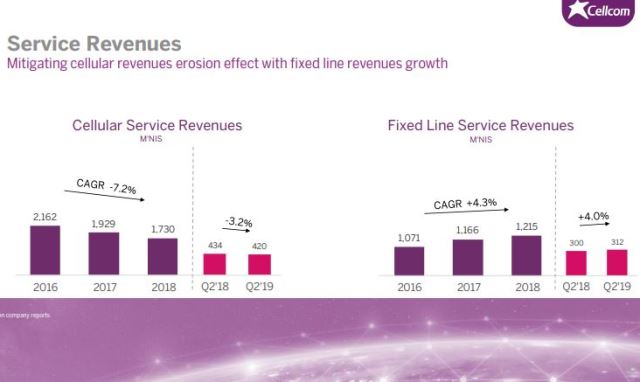Cellcom Israel CEO Nir Sztern has revealed that the telecom operator has dropped its Capex or capital expenditure during the second quarter of 2019.
 Cellcom Israel, Israel’s largest mobile phone operator, has invested NIS 113 million or $32 million in telecom networks, in deploying of fiber optic, information systems, software and TV set-top boxes and capitalization, compared to NIS 131 million or $37 million in Q2 2018.
Cellcom Israel, Israel’s largest mobile phone operator, has invested NIS 113 million or $32 million in telecom networks, in deploying of fiber optic, information systems, software and TV set-top boxes and capitalization, compared to NIS 131 million or $37 million in Q2 2018.
Cellcom Israel completed the investment transaction in IBC and the sale transaction of its fiber-optic infrastructure in residential areas to IBC.
Cellcom this week completed a deal to buy 70 percent of the Israel Broadband Co (IBC), which has exclusive rights to deploy fibre optics over infrastructure belonging to state-owned utility Israel Electric Corp.
“Following the completion of the transactions, we are expected to substantially decrease its capital investments as early as 2020 and the expenses for wholesale market access payments as more and more customers transfer to IBC’s fiber-optic infrastructure,” Shlomi Fruhling, chief financial officer of Cellcom Israel, said.
Cellcom projects 750,000 households will have access to its fibre network by the end of 2022.
 Cellcom Israel added approximately 45K mobile phone subscribers during the second quarter of 2019. Cellcom Israel’s cellular subscriber base reached approximately 2.745 million subscribers. Cellular churn rate reached 11.3 percent compared to 12.6 percent in the second quarter last year.
Cellcom Israel added approximately 45K mobile phone subscribers during the second quarter of 2019. Cellcom Israel’s cellular subscriber base reached approximately 2.745 million subscribers. Cellular churn rate reached 11.3 percent compared to 12.6 percent in the second quarter last year.
Cellcom’s mobile subscriber base fell 2.3 percent from a year ago to 2.745 million at the end of June. The number of subscribers to its internet-based TV service gained 22.6 percent to 239,000 while it grew the number of Internet customers by 12.1 percent.
Cellcom Israel CEO Nir Sztern said: “Alongside the competition in the communications market, the Cellcom group is in a substantial execution momentum and continues to develop its future growth engines.”
Cellcom Israel’s revenues fell 0.8 percent to NIS 920 million or $258 million from NIS 927 million or $260 million in the second quarter last year.
Cellcom Israel generated service revenues of NIS 420 million (+4 percent) from the cellular business and NIS 312 million (–1.6 percent) from fixed-line business.
Cellcom Israel’s ARPU reached 51.9 NIS or $14.6, compared to NIS 51.8 or $14.5 in Q2 last year. The increase in ARPU resulted mainly from increase of NIS 2.8 or $0.8 due to pre-paid and M2M subscribers’ deletion from the company’s cellular subscriber base.
Cellcom Israel posted operating income of NIS 6 million or $2 million against operating loss of NIS 5 million or $1 million in the second quarter last year.





